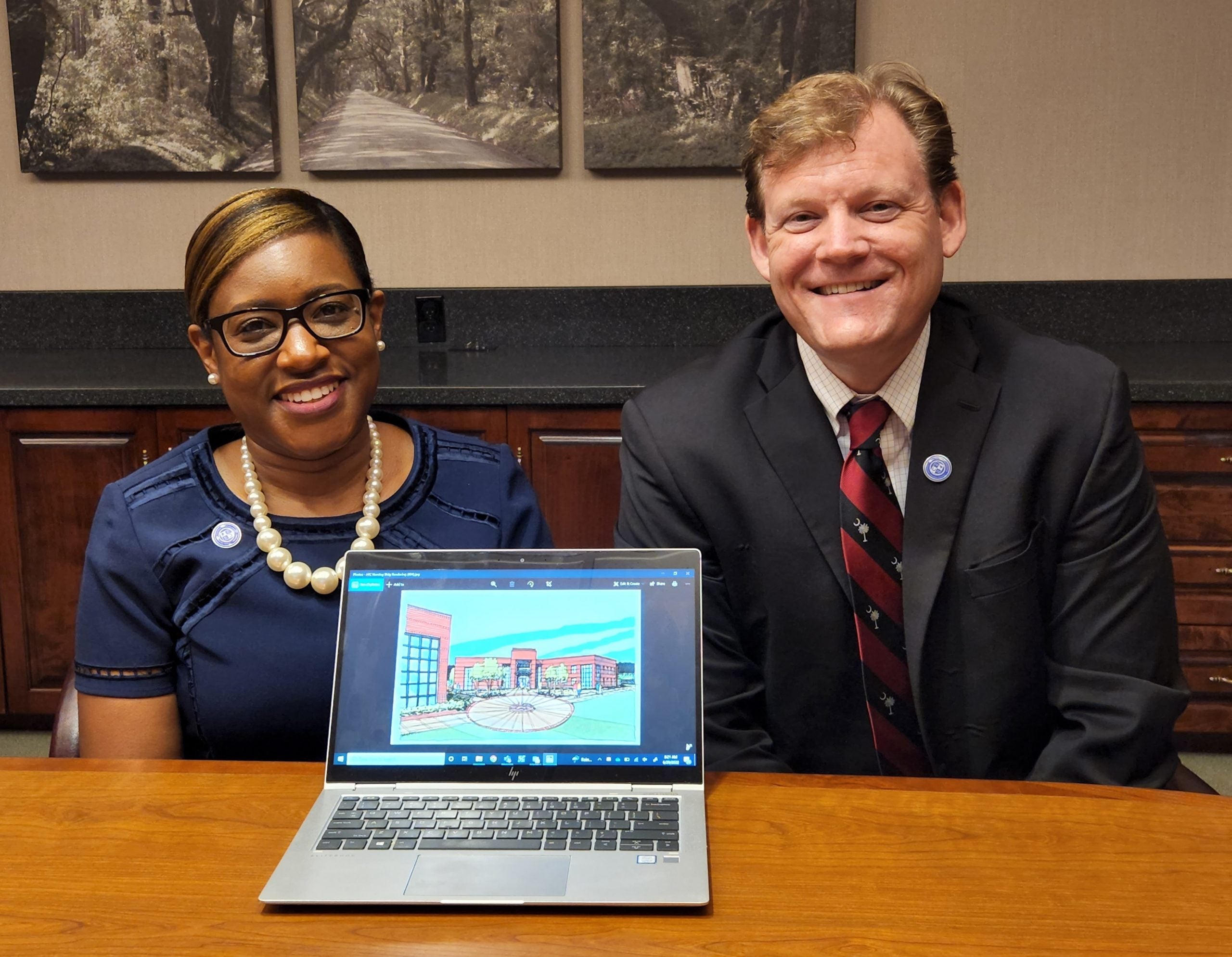Additional nursing education programs and a new building are coming to the Aiken Technical College campus on Jefferson Davis Highway.
Aiken Tech will receive $11.5 million from the SRS settlement money, signed off on by Gov. Henry McMaster when he signed South Carolina’s FY 2022-2023 budget.
Aiken Tech’s president, Forest Mahan, said it will be added to the $3 million the college received several years ago as seed money for the project.
“So, now we have the funding to build the 30,000 square foot Nursing Education Center,” he said. “We will do a fundraising effort to buy equipment, furniture and the like, because that is a separate process that we follow. But we now have secured the funding for the building, and we can start the process to go through the stages we need to get the building constructed.”

The settlement money, originally $600 million until $75 million was paid to the attorneys, stems from the Department of Energy’s failed mixed oxide fuel fabrication that was to be built at SRS along with the weapons grade plutonium brought to the state to be converted into fuel pellets for reactor fuel assemblies.In addition to the money, the settlement calls for the Department of Energy to remove the plutonium stored at SRS. It must be removed no later than 2037.
Aiken Tech currently offers a broad cross section of training, with an emphasis on nursing, through its health science curriculum. Options range from a certificate in pre-nursing, to an associate degree with a major in nursing.
The school can enroll about 144 students per year in the nursing programs. Dr. Hannah Williams, dean of nursing, said additional space offered with the new building will allow them to increase enrollment.
“Even before COVID hit, we were already walking into a nursing shortage. We already knew the average age for a nurse was over 50 years old, so they were in the process of preparing for retirement. So COVID just pushed that right along. With COVID, even those who were not prepared to retire, they’re leaving their profession or left the profession,” she said. “So, an opportunity like this greatly increases our ability to get more students and to help produce more knowledgeable, skilled nurses that are going out to the community taking care of you and I and our family members.”
In February 2022, the National Center for Biotechnology Information, part of the National Institutes of Health, updated a report on its website on the nursing shortage.
MORE: Location for Augusta Tech’s expanded automotive training facility revealed
It says nurses make up the largest section of the health profession with approximately 29 million nurses and midwives globally, with 3.9 million of those in the United States:
“According to The American Nurses Association (ANA), more registered nurse jobs will be available through 2022 than any other profession in the United States. According to an article in the Nursing Times, The US Bureau of Labor Statistics projects that more than 275,000 additional nurses are needed from 2020 to 2030. Employment opportunities for nurses are projected to grow at a faster rate (9%) than all other occupations from 2016 through 2026.”
Mahan said the new building is also expected to help open space in existing buildings for students to complete their core classes before transitioning to the nursing curriculum.
“One of the biggest challenges we’ve had is that for those individuals interested in any health science field, they want to try to get their biology and their chemistry out of the way,” he said. “We have to expand not only the nursing program capacity, but we also have to have the capacity for those getting their prerequisites out of the way because that way when they get into the nursing program, they can focus on the nursing courses.”
Nursing is a portable career. Training as a nurse can open doors to employment in healthcare virtually anywhere. That can be particularly beneficial to military spouses. With Fort Gordon in Richmond County, Fort Jackson near Columbia and the influx of cyber workers, Aiken Tech’s location means it can draw from both South Carolina and Georgia.
“With us being a two-year institution, as opposed to four years, we have a lot of military spouses and so on, that may come to this area. With the length of our program, it neatly fits right into their assignments. And a lot of times it does allow them the ability to come to our program, complete our program, and finish and graduate. So, when their spouse is assigned to the next place, then they’re walking out with the license to practice nursing,” Williams said.
Although not eligible for funding assistance from South Carolina, residents of Richmond and Columbia counties pay in-state tuition to attend Aiken Tech.
The college also offers instruction in the healthcare field for people who want to enter the field, but not necessarily go into nursing. Specifically, the institution offers the Patient Care Technician program.
“A person who comes to that program, which lasts exactly 12 months or one full year, they can walk away with a certificate or be a certified nursing assistant or CNA, they can also receive their certification as a phlebotomist, and then their overarching certification as a PCT, which encompasses CNA, phlebotomy and an EKG Technician,” Williams said. “These students are very flexible as to where they can work and the things they can do in hospitals, long term care facilities, home health, hospice, phlebotomy labs, so forth.”
Williams said they now are building a bridge from that to an associate’s degree program that will also include mental health studies. That degree can then be used if the student wants to transfer to a four-year college to pursue a bachelor’s degree and higher.
MORE: Atlanta Federal Bank economist gives lecture at Augusta Technical College
Work has not yet started on the new building. Mahan said they must wait for the funding to be in-hand before they can even begin the design process.
“We’ve had concepts, we’ve discussed what we’d like in the building. So, the next step will be going out and looking to find what we need to do in terms of architectural, getting people involved about designing the building. That will take probably this next year. Once we have all the official designs, then we start the process of approval, we have to go through various layers of state agencies to get approval to build anything new on campus demonstrate the value, the need of it and that it is not going to cost any more for the students,” he said.
Mahan anticipates the process from design to groundbreaking to completed building will take between two and three years.
As for the location on campus, he said he’d like it to be in a prominent place, one that is visible from Jefferson David Highway, highlighting the program and what Aiken Tech has to offer.
Dana Lynn McIntyre is a general assignment reporter for The Augusta Press. Reach her at dana@theaugustapress.com











